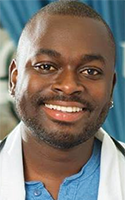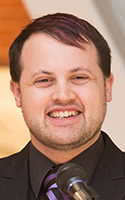Gender lines becoming blurred in nursing field
By Katie Coleman

Nursing is reportedly one of the fastest growing jobs in the health care industry. As the demand increases to support the aging baby boomer population, whether or not men are readily entering into the field is something to consider.
American society’s long-held belief that women provide care in superior ways to men has created a stereotype that nursing is a feminine role in the health care industry.
As of 2015, only 13 percent of nurses in the United States were men, according to the Washington Center for Equitable Growth.
That number has been rising since 1960 when only 2.2 percent were men.
The authors, Elizabeth Munnich and Abigail Wozniak, wrote that, “Increasing educational attainment, rising labor demand in health care, and liberalizing gender role attitudes explains around 50 percent of the growth.”
University at Buffalo’s School of Nursing Student Services’ third week snapshot of its fall 2017 student body reported that out of 446 graduate and undergraduate students enrolled, 83 were men.
I interviewed two men in the program about their experiences and perspective on the idea that their career paths are non traditional.
Seth Wagner, 28, is a registered nurse at Jericho Road Community Health Center and a graduate student at UBSON. After graduation in May, he plans to be a family nurse practitioner. With so many different cultural perspectives in Buffalo, Wagner said gauging attitudes on gender roles and what’s “normal” or “appropriate” is complex.
“When I wanted to start nursing school, I had an associate tell me, ‘Don’t bother, because you’ll never be as loving, caring or nurturing as a woman’,” said Wagner, who hasn’t experienced any adverse reactions on the job.
However, he did say certain aspects of nursing are a challenge due to cultural perspectives that can create barriers between a nurse and patient, such as gynecology care and obstetrics.
When it comes to barriers that are keeping the male to female ratio disproportionate, Wagner said stereotypical gender roles are the biggest barrier. “But that’s changing with the advent of the nurse practitioner and family practice nurse,” Wagner said. “Nurses are becoming leaders in health care as opposed to simply supportive to medical doctors.”
Kwasi Adusei, 26, is a teaching assistant at UBSON and teaches clinical skills and conducts mental health lectures. He’s currently in UBSON’s mental health nurse practitioner program studying to specialize in psychiatry and get his Doctor of Nursing Practice degree.
Adusei thinks the ratio of men to women in nursing is changing. He said that shifting language, as a culture, is an important step to change the way people think. Instead of branding men as “male nurses”, just call them nurses. Even assigning a new name to the role could have a profound impact.
“When you say ‘nurse’, in your head, because of conditioning, you see a female. When you say the word ‘medic’ that may not be the case,” Adusei said, who thinks that calling nurses hospital medics could shift society’s perspective toward a more gender-neutral way of thinking.
“As a culture, gender-normative roles are shifting where our society is looking at gender in drastically different ways. This is a generation that fully accepts and embraces gender-neutral bathrooms, and men staying at home and taking care of the kids,” Adusei said. “It would be nice having more men in nursing and more diversity, but I accept that the field is feminine-dominated and that’s absolutely OK.”
He grew up surrounded by women working in the health care industry, which he said undeniably influenced his life direction.
Consistent with Wagner, Adusei thinks stereotypical gender roles and the language society is conditioned to use are the biggest reasons nursing still has a feminine connotation in the health care industry.

“When you see women entering male-dominated fields, they are almost looked up to for being proficient and able to survive. When you see men entering female-dominated careers, the switch is sort of flipped and some have the opposite reaction,” Adusei said.
However, despite the fact the number of men in nursing is still low, he still thinks he’s had advantages in the field as a result of being male.
“When I interviewed at Roswell Park Cancer Institute to be a nursing assistant, I was still a student and in my interview they said they were viewing me as a manager on that floor at some point,” Adusei said. “Granted, I went into that interview with a lot of leadership experience, so it could just be my perception, but I think that being male influenced their perception of who I’d become.”
Some schools are actively recruiting and providing mentorship for students entering non-traditional career paths.
Trocaire College in Buffalo recently launched a professional mentorship program for non-traditional students for the spring semester. Students eligible include men in health care programs such as nursing, massage therapy and medical assisting, and women in programs such as computer network administration and health information technology.
Catherine Griswold, dean of Trocaire’s Catherine McAuley School of Nursing, is at the head of a mentoring program designed specifically for male students in its nursing program.
Griswold said providing support, mentorship, opportunities and services is the key to breaking the stigma and leading students toward success.
“I think the stigma is slowly going away,” Griswold said. “We still have work to do. We need to stop calling them ‘male nurses’ and just call them nurses.” Griswold focuses on inclusive language and art that can help socialize culture toward gender-neutral ideas about the health care industry.
Trocaire has seen an increase in the number of male students, mostly new or coming back for a second degree.
“The numbers are still low for underrepresented minorities across racial and financial divides,” Griswold said.
However, buoyed by a federal grant Trocaire received this year to work with underrepresented nursing students, the school is focused on increasing opportunities, support and ultimately the number of men in its nursing programs.
